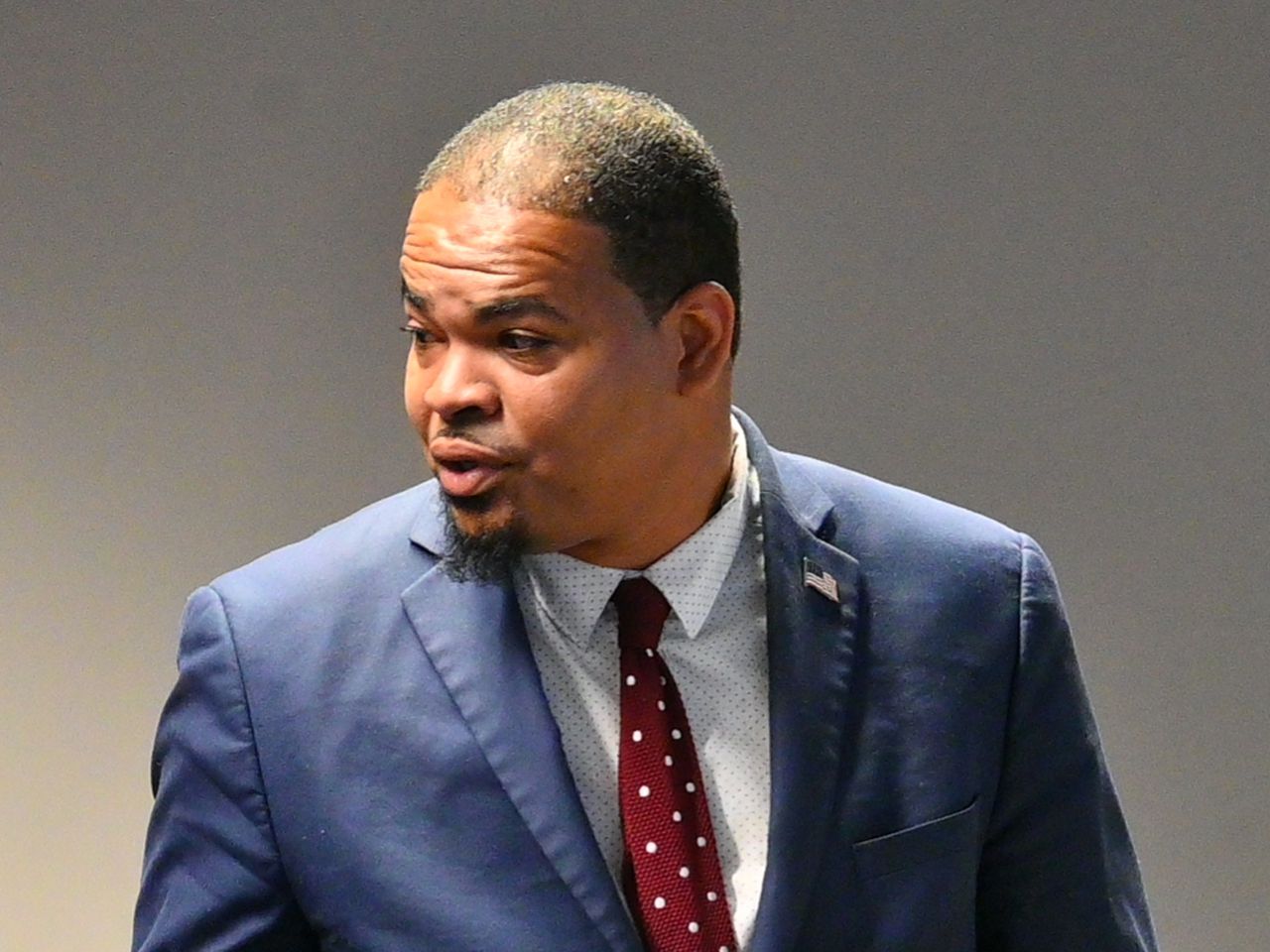Family continues call for body cam footage of Jawan Dallas death in Mobile
The grieving family of Jawan Dallas continued their push on Tuesday for authorities to release body camera footage of his July 2 death during an altercation with police, only to get denied by Alabama state law.
The public pleas came, once again, before the Mobile City Council. Council members, also once again, said the decision to release the footage was out of their hands.
Related content:
“Show the video and we’ll go from there,” said Phil Williams, Dallas’ father.
Said Christine Dallas, his mother, “I feel like you are all hiding this video. If we can see this video, we can know how and why my son died on this particular night.”
Mobile County District Attorney Keith Blackwood at a Turning Point USA event on Monday, April 10, 2023, at the Marx Library on the campus of the University of South Alabama in Mobile, Ala. (John Sharp/[email protected]).
The comments came one day after Mobile County District Attorney Keith Blackwood, in a letter to the Dallas family attorney, said that authorities were unable to show the family the police body-worn camera footage because the case remains under investigation and is set to go before a grand jury.
Blackwood, in his denial letter, cited Alabama state law that prohibits revealing physical evidence pertinent to a grand jury proceeding.
The family’s attorney, Roderick Van Daniel of Birmingham, wrote back to Blackwood calling his denial “complete injustice.”
He initially filed a request to have the family view the video footage, citing a new Alabama state law that allows requests to be made to access it. But the new law also allows law enforcement to deny access if an investigation is ongoing.
“Mrs. Dallas is only seeking the truth, she deserves the truth, the family deserves the truth, and the Mobile community deserves the truth,” Van Daniel said.

Birmingham attorney Roderick Van Daniel speaks during the Mobile City Council meeting on Tuesday, Sept. 12, 2023, at Government Plaza in Mobile, Ala. (John Sharp/[email protected]).
At issue is how Dallas died after encountering police near a trailer in Theodore.
Initial police reports say he died after a Mobile police officer tased him during an altercation that occurred away from a burglary scene that authorities initially arrived to investigate.
The Dallas family claims he was killed after he declined to produce a state-issue ID to police because he did not have an ID.
“He was murdered,” his father said.
Mobile police have previously said that Dallas evaded police after they showed up to investigate the burglary.
Chief Paul Prine, in July, said responding officers feared for their own safety because Dallas’ behavior and “strange movement in the car” that included moving into the backseat.
Prine also said that Dallas, a convicted felon, was later found to have drugs – crystal meth and analog marijuana known as specie.
The investigation is continuing to unfold in the backdrop of criticism directed at Alabama officials for withholding body cam footage while other nearby states — namely Tennessee — have released them following high-profile incidences.
There has been at least one outlier of late. In Florence, police released body cam footage of an arrest outside a gas station even though a criminal investigation is not concluded.
That case, however, is being investigated in municipal court.
Mobile City Attorney Ricardo Woods said that because the investigation into Dallas’ death is going to a grand jury, none of the physical evidence can be provided to anyone.
He said a violation of the state law is a felony and can be punishable by up to three years in prison or a $5,000 fine.
“As a city attorney, it’s my obligation to protect the city but the people who represent the city and the police department and all who come into contact with this information,” Woods said. “We do not have discretion to (release the body cam footage) at this point.”
Woods declined to give a timeline as to when the grand jury might consider the case. He said it could take “months” for the investigation to conclude but added that “we are putting a rush on toxicology” and for an official cause of death to be released.
“The grand jury process is what it is,” he said. “I understand the frustration of continuing to ask. But (the City Council) does not have control of this aspect. We cannot speed up the timing.”
Some council members said that for the footage to be released to the family, there needs to be changes in state law.
“I believe the family should see it,” said Councilman Cory Penn. “I believe they have that right. But from my authority as a council member, I don’t have that (right to release it to them). We have to take this to our State Legislature as well.”
The GOP supermajority Legislature has been hesitant toward allowing widespread dissemination of body cam footage ever since the device became commonly used among law enforcement officers within the past 10 years.
The newest law, which went into effect on September 1, allows law enforcement the ability to deny the footage’s release. But the new law does allow people whose image or voice are the subject of a body camera or dash camera recording to file a written request to review them. That also applies toward immediate family members.
The Alabama Supreme Court ruled in 2021 that the footage is not subject to the state’s open records law. The court’s ruling continues to allow police to deny media or public request for a host of police records, no matter the public controversy or outcry.

Jawan Dallas (Contributed)
The Dallas family says they will not stop with their public requests.
“Releasing the video to Christine Dallas will not affect an ongoing investigation,” Van Daniel said. “She deserves the opportunity to view the last moments of her son’s life.”
